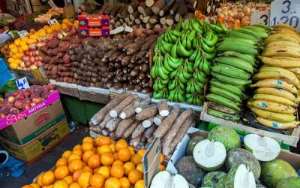
Ghana is currently facing inflation at an 18-year high as food prices and transport cost surge. Inflation is quoted at 27.6% in May from 23.6% in the previous month, the highest pace of acceleration since January 2004. Ironically, the Minister for Food and Agriculture is reported by the AncHOR newspaper 21-22 June, 2022 edition to have stated that foodstuff are left to rot in some parts of the country due to poor roads. Also, there are numerously yearly reports of food glut across major food producing centers in the country with similar reports of shortage in others places. Seasonal (temporal food glut and shortages) uneven distribution of food and general agricultural commodities is also a common occurrence.
In instances where transportation is made available, most of them are not appropriate. For example, tomatoes and other perishables are expected to be transported in cold chain. Cold chain transportation refers to the transportation of food at present low temperatures to guarantee the freshness of food during transportation to reduce loss. There are several instances that tomatoes and other perishables are moved from where they are produced and by the time they reach where they are needed a considerable portion of it lost.
From the above, what is clear is that the country is having food rotting away in some parts and at some seasons of the year who at same time suffers from an unacceptably high level of inflations largely driven by food prices. In effect the country can only be reaping the results of a historic policy failure to connect increased production with efficient marketing. It is evident that over the years Ghana’s Agricultural sector policies and programmes interventions have largely focused on increasing production at the farm level without much attention on how the products resulting from the increased production will be efficiently distributed spatially (across space) and temporally (across time/seasons). End results are; wasted production outputs poorer small holder farmer and a nation of abundance production struggling for food at an affordable cost to feed its population
The question now is what can be done to match the level of production with consumption across time and space? The answer is simple, connect farm level production interventions with marketing level distribution interventions, among many I propose the: Ghana Agricultural Commodities Transport Services (Ghana-ACTs)
Currently there is no dedicated public sector transport arrangement for the transportation of agricultural commodities from productions centers to other parts of the country. The distribution of the produced is solely left in the hands of private market players who makes their own arrangement to transport food from the farmgate to the end consumer markets. With so many market intermediaries and individual transport arrangement, the products get to the final consumer market at higher per unit market cost which is passed on to the final consumer.
With the Ghana-ACTs, government can partner with the private sector to establish and operate dedicated agricultural products transport services at all regional food production epicenters for the real time transportation of agricultural commodities across the country. The Ghana-ACTs will have a farmgate link to evacuate the product from the farmgates/rural outlets to dedicated centers for inter-regional distribution.
The Ghana -ACTs should be structured to have the right transportation system that ensures that food is moved from where it is to where it is needed. It calls for not only having the facilities, but the appropriate facilities that ensures that the food is safe.
Government can make use of the already built buffer stock storage facilities across the country as center for the aggregation and transits for the commodities. The facilities can be expanded and equipped with drying equipment for cereal drying and cool storage for perishable commodities
A well-functioning ACT will not only ensure timely and easy evacuation of agricultural commodities from the farm level but will also reduce the per unit transport cost to consumer markets. It will reduce post-harvest loses significantly and give better farmgate prices to producers. Ghana-ACTs will consolidate the production side gains and stabilize food prices and distribution across space and time.
The time to ACT is now, Covid-19 coupled with the Russia-Ukraine have taught us a great lesson that we cannot continue to rely on other countries, the time to rely on ourselves is now. It is a must to fix the food distribution system for efficiency and the practical proposal to fix it is the Ghana Agricultural Commodities Transport Services (Ghana-ACTs).
By
Zuobog Philip Neri
Agriculture and Food Security Consultant
PhD Candidate in Agricultural Economics-UDS, Tamale




 Tuesday’s downpour destroys ceiling of Circuit Court '8' in Accra
Tuesday’s downpour destroys ceiling of Circuit Court '8' in Accra
 SOEs shouldn't compromise on ethical standards, accountability – Akufo-Addo
SOEs shouldn't compromise on ethical standards, accountability – Akufo-Addo
 Father of 2-year-old boy attacked by dog appeals for financial support
Father of 2-year-old boy attacked by dog appeals for financial support
 Jubilee House National Security Operative allegedly swindles businessman over sa...
Jubilee House National Security Operative allegedly swindles businessman over sa...
 Nobody can order dumsor timetable except Energy Minister – Osafo-Maafo
Nobody can order dumsor timetable except Energy Minister – Osafo-Maafo
 Mahama wishes National Chief Imam as he clock 105 years today
Mahama wishes National Chief Imam as he clock 105 years today
 J.B.Danquah Adu’s murder trial: Case adjourned to April 29
J.B.Danquah Adu’s murder trial: Case adjourned to April 29
 High Court issues arrest warrant for former MASLOC Boss
High Court issues arrest warrant for former MASLOC Boss
 Align academic curriculum with industry needs — Stanbic Bank Ghana CEO advocates
Align academic curriculum with industry needs — Stanbic Bank Ghana CEO advocates
 Election 2024: We'll declare the results and let Ghanaians know we've won - Manh...
Election 2024: We'll declare the results and let Ghanaians know we've won - Manh...
